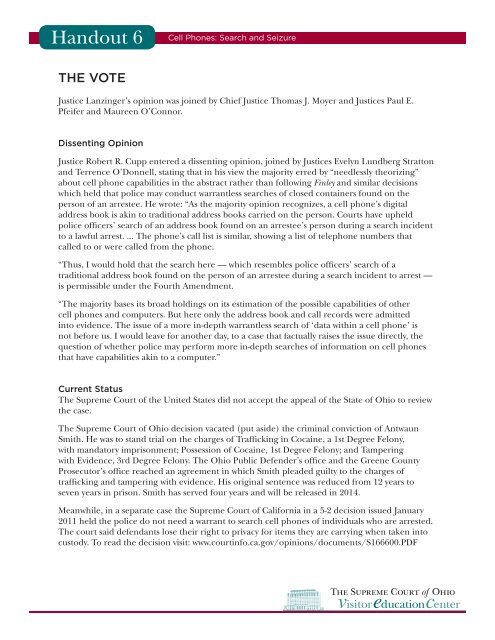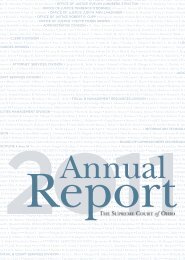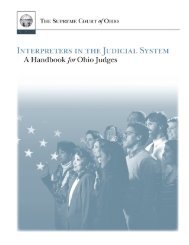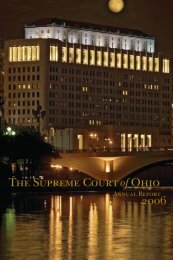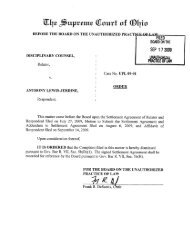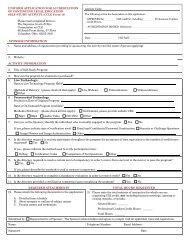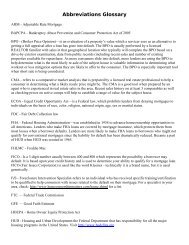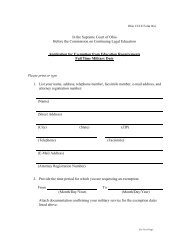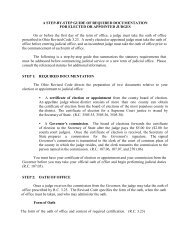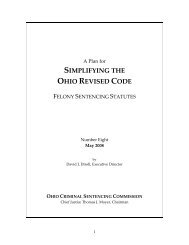cell phones: search and seizure - Supreme Court - State of Ohio
cell phones: search and seizure - Supreme Court - State of Ohio
cell phones: search and seizure - Supreme Court - State of Ohio
Create successful ePaper yourself
Turn your PDF publications into a flip-book with our unique Google optimized e-Paper software.
H<strong>and</strong>out 6<br />
Cell Phones: Search <strong>and</strong> Seizure<br />
THE VOTE<br />
Justice Lanzinger’s opinion was joined by Chief Justice Thomas J. Moyer <strong>and</strong> Justices Paul E.<br />
Pfeifer <strong>and</strong> Maureen O’Connor.<br />
Dissenting Opinion<br />
Justice Robert R. Cupp entered a dissenting opinion, joined by Justices Evelyn Lundberg Stratton<br />
<strong>and</strong> Terrence O’Donnell, stating that in his view the majority erred by “needlessly theorizing”<br />
about <strong>cell</strong> phone capabilities in the abstract rather than following Finley <strong>and</strong> similar decisions<br />
which held that police may conduct warrantless <strong>search</strong>es <strong>of</strong> closed containers found on the<br />
person <strong>of</strong> an arrestee. He wrote: “As the majority opinion recognizes, a <strong>cell</strong> phone’s digital<br />
address book is akin to traditional address books carried on the person. <strong>Court</strong>s have upheld<br />
police <strong>of</strong>ficers’ <strong>search</strong> <strong>of</strong> an address book found on an arrestee’s person during a <strong>search</strong> incident<br />
to a lawful arrest. ... The phone’s call list is similar, showing a list <strong>of</strong> telephone numbers that<br />
called to or were called from the phone.<br />
“Thus, I would hold that the <strong>search</strong> here — which resembles police <strong>of</strong>ficers’ <strong>search</strong> <strong>of</strong> a<br />
traditional address book found on the person <strong>of</strong> an arrestee during a <strong>search</strong> incident to arrest —<br />
is permissible under the Fourth Amendment.<br />
“The majority bases its broad holdings on its estimation <strong>of</strong> the possible capabilities <strong>of</strong> other<br />
<strong>cell</strong> <strong>phones</strong> <strong>and</strong> computers. But here only the address book <strong>and</strong> call records were admitted<br />
into evidence. The issue <strong>of</strong> a more in-depth warrantless <strong>search</strong> <strong>of</strong> ‘data within a <strong>cell</strong> phone’ is<br />
not before us. I would leave for another day, to a case that factually raises the issue directly, the<br />
question <strong>of</strong> whether police may perform more in-depth <strong>search</strong>es <strong>of</strong> information on <strong>cell</strong> <strong>phones</strong><br />
that have capabilities akin to a computer.”<br />
Current Status<br />
The <strong>Supreme</strong> <strong>Court</strong> <strong>of</strong> the United <strong>State</strong>s did not accept the appeal <strong>of</strong> the <strong>State</strong> <strong>of</strong> <strong>Ohio</strong> to review<br />
the case.<br />
The <strong>Supreme</strong> <strong>Court</strong> <strong>of</strong> <strong>Ohio</strong> decision vacated (put aside) the criminal conviction <strong>of</strong> Antwaun<br />
Smith. He was to st<strong>and</strong> trial on the charges <strong>of</strong> Trafficking in Cocaine, a 1st Degree Felony,<br />
with m<strong>and</strong>atory imprisonment; Possession <strong>of</strong> Cocaine, 1st Degree Felony; <strong>and</strong> Tampering<br />
with Evidence, 3rd Degree Felony. The <strong>Ohio</strong> Public Defender’s <strong>of</strong>fice <strong>and</strong> the Greene County<br />
Prosecutor’s <strong>of</strong>fice reached an agreement in which Smith pleaded guilty to the charges <strong>of</strong><br />
trafficking <strong>and</strong> tampering with evidence. His original sentence was reduced from 12 years to<br />
seven years in prison. Smith has served four years <strong>and</strong> will be released in 2014.<br />
Meanwhile, in a separate case the <strong>Supreme</strong> <strong>Court</strong> <strong>of</strong> California in a 5-2 decision issued January<br />
2011 held the police do not need a warrant to <strong>search</strong> <strong>cell</strong> <strong>phones</strong> <strong>of</strong> individuals who are arrested.<br />
The court said defendants lose their right to privacy for items they are carrying when taken into<br />
custody. To read the decision visit: www.courtinfo.ca.gov/opinions/documents/S166600.PDF


